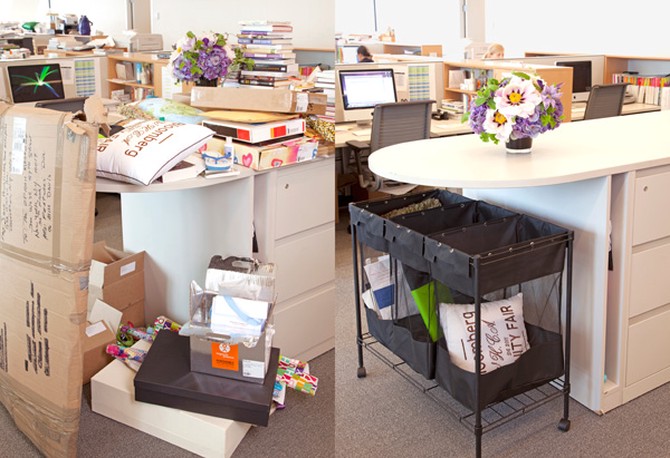Extreme Office Makeover: The O Magazine Edition
Master organizer Peter Walsh takes on the tsunami of books, gifts, food, and—yes—Betamax tapes threatening to engulf O magazine.
By Meredith Bryan
Once we've cleared our desks, the floor, and the communal storage spaces around the office, Walsh asks us to set limits for the future: Everyone gets one file drawer for personal belongings (currently, an average bank of filing cabinets contains one drawer for files and ten for shoes, packaged snacks, and old cell phone chargers). When our drawer no longer closes, we must remove something before adding new items.
Certain high-volume objects get a "system." Take King's books. She receives dozens every month, most sent by people hoping to appear on her show on OWN. Editorial assistant Arianna Davis stacks the books on one of the aforementioned communal filing cabinets, where they remain in perpetuity, claiming more and more surface area, even though King will never open many of them. Meanwhile, five feet away, a floor-to-ceiling bookshelf is being used to display framed photos of everyone Oprah has ever interviewed for the magazine. Walsh asks a simple question: Why not move the books to the bookshelf?
At this, everyone looks confused. Our editorial business coordinator, Kori Scott, suggests that Walsh ask Kaylin for permission to relocate the photos; Kaylin directs Walsh to Casey; Casey, recalling that Oprah herself gave the pictures to King as a gift, refers him to Davis; Davis e-mails King, who is in Chicago.
King's speedy yes bolsters everyone—hooray for small victories!—and Walsh stakes out space for the photos on an empty stretch of white wall. As he helps transfer King's books to their new shelves, he explains that Davis will be in charge of quantity control: Each week's arrivals will get their own shelf, until all five are full. Then the five-week-old books will be donated in order to make room for the current week's stock, and so on.
The interns, meanwhile, are tackling the largest task of all: the row of tall cabinets stuffed with old O's. After several huddled discussions and a few phone calls to various company executives, we've reluctantly agreed to part with all but ten copies of each back issue. This will clear up space for the food department's library of cookbooks, currently monopolizing the bookshelf in the books department and leaving the books editors with no shelves at all.
As he gleefully flings issues from 2001 into a Dumpster, Walsh lets out a muffled shriek. He's stumbled upon a long-forgotten stash of VHS and Betamax tapes. "It's like gazing into 1985!" he gasps, looking genuinely stricken. Several people actually blush. We work at a modern media company, after all; we publish an iPad app and live-tweet our workdays. Still, no one will authorize the disposal of the tapes. It's becoming clear that a peculiar power vacuum is part of our problem. Since no one is in charge of keeping order, no one feels qualified to make decisions. Everyone is relieved when Davis finally thinks to call the former editor in chief's former assistant, who grants permission to throw the tapes away.
Certain high-volume objects get a "system." Take King's books. She receives dozens every month, most sent by people hoping to appear on her show on OWN. Editorial assistant Arianna Davis stacks the books on one of the aforementioned communal filing cabinets, where they remain in perpetuity, claiming more and more surface area, even though King will never open many of them. Meanwhile, five feet away, a floor-to-ceiling bookshelf is being used to display framed photos of everyone Oprah has ever interviewed for the magazine. Walsh asks a simple question: Why not move the books to the bookshelf?
At this, everyone looks confused. Our editorial business coordinator, Kori Scott, suggests that Walsh ask Kaylin for permission to relocate the photos; Kaylin directs Walsh to Casey; Casey, recalling that Oprah herself gave the pictures to King as a gift, refers him to Davis; Davis e-mails King, who is in Chicago.
King's speedy yes bolsters everyone—hooray for small victories!—and Walsh stakes out space for the photos on an empty stretch of white wall. As he helps transfer King's books to their new shelves, he explains that Davis will be in charge of quantity control: Each week's arrivals will get their own shelf, until all five are full. Then the five-week-old books will be donated in order to make room for the current week's stock, and so on.
The interns, meanwhile, are tackling the largest task of all: the row of tall cabinets stuffed with old O's. After several huddled discussions and a few phone calls to various company executives, we've reluctantly agreed to part with all but ten copies of each back issue. This will clear up space for the food department's library of cookbooks, currently monopolizing the bookshelf in the books department and leaving the books editors with no shelves at all.
As he gleefully flings issues from 2001 into a Dumpster, Walsh lets out a muffled shriek. He's stumbled upon a long-forgotten stash of VHS and Betamax tapes. "It's like gazing into 1985!" he gasps, looking genuinely stricken. Several people actually blush. We work at a modern media company, after all; we publish an iPad app and live-tweet our workdays. Still, no one will authorize the disposal of the tapes. It's becoming clear that a peculiar power vacuum is part of our problem. Since no one is in charge of keeping order, no one feels qualified to make decisions. Everyone is relieved when Davis finally thinks to call the former editor in chief's former assistant, who grants permission to throw the tapes away.
Published 08/16/2011


